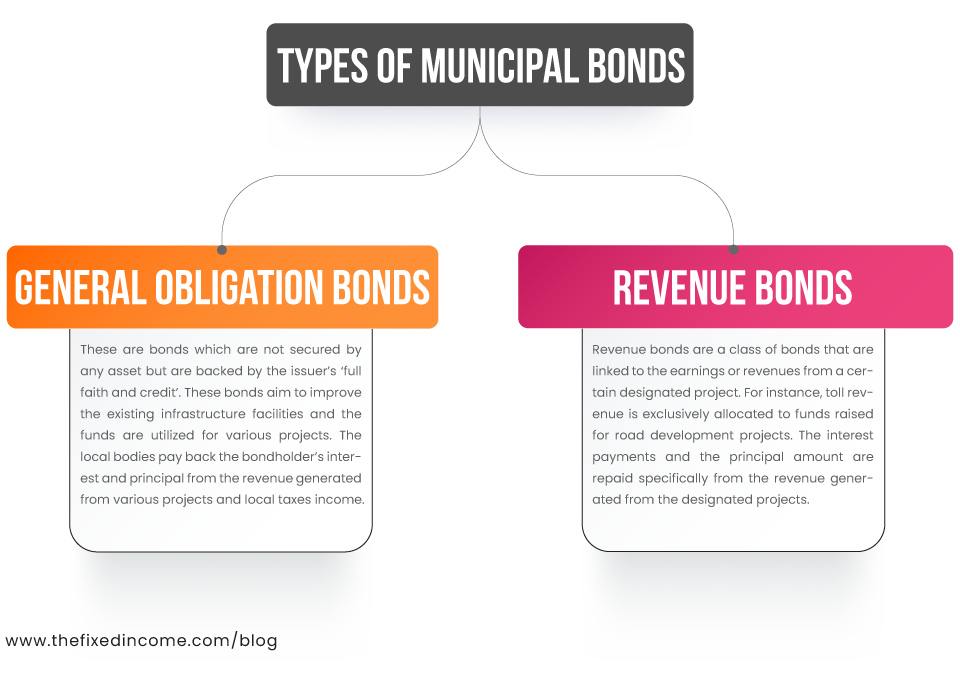In India, there are three levels of governance system: the central, the state, and the municipal. The third tier of this chain consists of municipalities and local bodies, which are largely dependent upon property taxes, entertainment taxes, land taxes, grants from the central and state governments to cover their expenditures. This is because the local government doesn’t have enough autonomy to levy taxes, grant exemptions, or even borrow funds, making them dependent on bank loans or resources of state and centre. Nevertheless, the situation has changed since the last few years as the government has taken steps to open up the debt market to local authorities, resulting in a surge of bond issuances by municipalities.
Municipal bonds also known as “Muni Bonds” are debt securities issued by the local governments or municipalities. They serve as a source of financing for various schemes of affordable housing, integrated transport systems infrastructure, public works projects like roads, water & electricity supply, sewerage, schools, hospitals, and other capital needs of the local bodies. The issuing body makes the payment of interest on these fixed income securities through periodic coupon payments and principal repayment on bond maturity to the bondholders. Interest rates and bond duration will be determined by the time period for which funds are borrowed, the company’s credit quality, and several other factors. Generally an escrow account is maintained for the servicing of municipal bonds, which means that funds raised/ revenue generated from the project replenish the escrow account and the debt (interest as well as principal) is serviced from there.
History of Municipal Bonds in India
The first municipal bond was issued in 1997 in India by the Bengaluru Municipality. Thereafter, Ahmedabad Municipality followed in 1998. Indore Municipality became the first municipal corporation to list on the NSE in 2018, while Ghaziabad Municipality became the first municipal corporation to issue green bonds in India in 2021.
In the year 2005, municipal bond issuances came to a screeching halt with the launch of the Jawaharlal Nehru National Urban Renewal Mission (JNNURM) which plans to provide grants to municipal corporations to finance urban renewal. The government, however, has undertaken measures since then to revive municipal bonds by providing grants for the issuing of municipal bonds in the AMRUT Programme schemes, etc. RBI has also suggested pooled debt financing, where a common bond is issued by several municipal bodies to reduce the issuing costs of debt.
Regulatory framework for municipal bonds in India
The Municipal Bonds are regulated and issued as per the provisions of Issue and listing of Municipal Debt Securities Regulations 2015 formulated by the Securities and Exchange Board of India. In order to regulate and increase investor confidence in municipal bonds, SEBI has provided detailed guidelines on the issue and listing process. For increasing safety, SEBI has specified that the issuer shall create an escrow account and establish a structured payment mechanism for the debt servicing of the municipal debt securities, as specified by the Board. In addition, these municipalities are required to obtain credit rating from at least one credit rating agency (like CRISIL, India Ratings etc.) registered with the Board before issuing Bonds in the market which will assess the capacity of the issuer to repay the debt on bond maturity.
Types of Municipal Bonds
Mainly the municipal bonds are of two types. They are as follows:


There is however a hybrid mechanism whereby the general revenue of the Municipality is used as a backup to service the bond in case charges are insufficient.
Benefits of Investing in Municipal Bonds
- It is pretty useful and important to have municipal bonds in your bond portfolio if you want to invest in your city’s future. They are also an excellent choice for people who wish to make sure they are part of the development of their cities.
- Due to the enhanced regulations by SEBI and independent Credit rating by CRAs can play a vital role in attracting new investors by providing independent and credible bond ratings by assessing the risks and strengths of municipal bodies.
- Municipal bonds work similarly to other types of debt securities, such as government bonds, state and local bonds. They’re issued by local governments or municipal bodies, which means that investors’ risk is minimized as compared to other risky asset classes.
- Municipal bonds are a great option to add to a bond portfolio for investors who want to invest in a reliable asset with fixed returns. Investing in the municipal bond market can be a great way to diversify your portfolio, earn competitive bond yields, and protect yourself from volatile market moves.
- According to SEBI regulations, municipalities are required to keep designated escrow accounts and use a structured payment method for debt servicing which in turn will boost investor trust while investing in bonds.
Final Words
Recently during the Budget speech on February 01, 2023, Finance Minister Nirmala Sitharaman, stated that municipalities will be encouraged to improve their creditworthiness to be able to issue municipal bonds. So the government is promoting and aiding the municipalities for raising funds via issuing bonds in India.
To conclude it can be stated that the Centre’s renewed push in recent years through programmes like AMRUT has encouraged local governments to issue more municipal bonds. The municipal bond market in India may experience significant growth in the years to come thanks to provisions relating to exchange listings in place, participation of major credit rating agencies in the municipal rating space, and support from the Central government in the form of reform-related financial incentives.






















